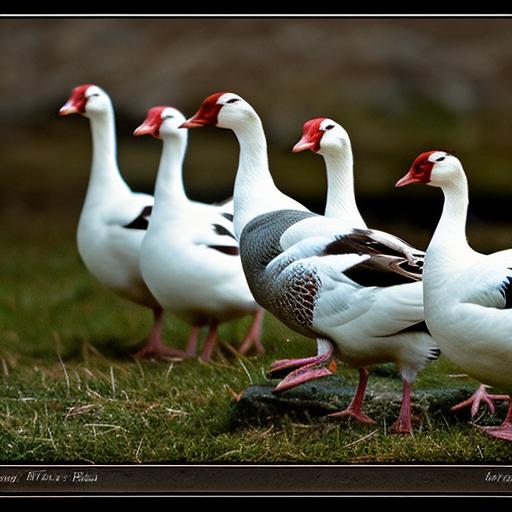Domestic geese have a long history of being kept by humans for various purposes. They are believed to have been domesticated over 4,000 years ago in ancient Egypt and Mesopotamia. These birds were initially kept for their meat, feathers, and eggs. Over time, domestic geese have also become popular as pets and for pest control purposes.
There are several different breeds of domestic geese, each with its own unique characteristics. Some of the most common breeds include the Toulouse, Embden, Chinese, and African geese. These breeds vary in size, temperament, and appearance. Some are known for their large size and meat production, while others are prized for their beautiful plumage.
Key Takeaways
- Domestic geese are a popular and rewarding addition to many households.
- Keeping domestic geese can provide benefits such as pest control and companionship.
- Choosing the right breed of domestic geese is important for meeting your specific needs.
- Proper housing, feeding, and health considerations are crucial for the well-being of domestic geese.
- Domestic geese have unique social behaviors and can be trained and handled with care.
Benefits of Keeping Domestic Geese as Close Neighbors
One of the main benefits of keeping domestic geese is their natural pest control abilities. Geese are excellent at foraging and can help keep your yard or garden free from pests such as insects and weeds. They will eat grasshoppers, slugs, snails, and other small creatures that can damage plants or spread diseases. By allowing geese to roam freely in your yard or garden, you can reduce the need for chemical pesticides and herbicides.
In addition to pest control, domestic geese also provide a valuable source of fertilizer for gardens. Their droppings are rich in nutrients and can be used to fertilize plants. By allowing geese to graze in your garden or providing them with a designated area to roam, you can benefit from their natural fertilizing abilities.
Furthermore, domestic geese can provide entertainment and companionship. They are social animals that enjoy interacting with humans and other animals. Watching geese waddle around your yard or swim in a pond can be a source of amusement and relaxation. Additionally, geese can form strong bonds with their human caretakers and provide companionship.
Choosing the Right Breed of Domestic Geese for Your Needs
When choosing a breed of domestic geese, there are several factors to consider. First, you should consider the purpose for which you are keeping geese. If you are primarily interested in meat production, then breeds such as the Embden or Toulouse geese may be suitable. These breeds are known for their large size and meat quality.
If you are looking for geese for their ornamental value, then breeds such as the Chinese or African geese may be more suitable. These breeds have unique and beautiful plumage that can add aesthetic value to your yard or garden.
It is also important to consider the temperament and behavior of different breeds. Some breeds, such as the Chinese geese, are known for being more docile and friendly towards humans. Others, such as the African geese, can be more aggressive and protective of their territory.
Housing and Feeding Domestic Geese
Domestic geese require appropriate housing to ensure their safety and well-being. They need a sheltered area where they can rest and sleep at night, as well as protection from predators. The housing should be spacious enough to allow the geese to move around comfortably and have access to fresh water.
Geese also require a balanced diet to maintain their health. They should have access to fresh water at all times, as well as a variety of grasses, grains, and vegetables. It is important to provide them with a balanced diet that meets their nutritional needs.
Health and Safety Considerations for Domestic Geese
Like any other animal, domestic geese can be prone to certain health issues. Some common health issues in geese include respiratory infections, parasites, and foot problems. It is important to provide regular veterinary care and monitor the health of your geese.
To prevent health issues, it is important to provide a clean and sanitary environment for your geese. Regularly clean their housing and provide fresh bedding. Additionally, make sure they have access to clean water and a balanced diet.
In terms of safety, domestic geese can be vulnerable to predators such as foxes, raccoons, and dogs. It is important to provide appropriate fencing and secure housing to protect them from predators. Additionally, it is important to supervise them when they are outside to ensure their safety.
Handling and Training Domestic Geese

Handling and training domestic geese can be a rewarding experience. Geese are intelligent animals that can be trained to respond to commands and interact with humans. However, it is important to approach handling and training with patience and respect for the geese.
When handling geese, it is important to approach them calmly and confidently. Avoid sudden movements or loud noises that may startle them. It is also important to establish trust and build a bond with the geese through positive reinforcement and rewards.
Socialization is also an important aspect of handling and training domestic geese. Geese are social animals that thrive in the company of others. It is important to provide opportunities for them to interact with other geese or animals to ensure their social well-being.
Domestic Geese and Their Role in Pest Control
Domestic geese can play a valuable role in pest control. They are natural foragers and will eat a variety of pests that can damage plants or spread diseases. Geese will eat insects such as grasshoppers, beetles, and flies, as well as small creatures like snails and slugs.
By allowing geese to roam freely in your yard or garden, you can reduce the need for chemical pesticides and herbicides. This can help create a more environmentally friendly and sustainable approach to pest control.
Domestic Geese and Their Impact on the Environment
While domestic geese can provide several benefits, they can also have an impact on the environment. One potential negative impact is their grazing behavior, which can lead to overgrazing and damage to vegetation. It is important to manage their grazing habits and provide them with appropriate areas to graze.
Additionally, geese can produce a significant amount of waste, which can contribute to water pollution if not managed properly. It is important to regularly clean their housing and provide appropriate waste management systems to minimize the environmental impact.
Domestic Geese and Their Social Behavior
Domestic geese are social animals that thrive in the company of others. They form strong bonds with their flock mates and can become stressed or lonely if kept alone. It is important to provide a suitable social environment for domestic geese by keeping them in groups or pairs.
Geese also have a hierarchical social structure, with dominant individuals asserting their authority over others. It is important to provide enough space and resources to prevent aggression and ensure the well-being of all geese.
The Joys and Challenges of Keeping Domestic Geese as Close Neighbors
Keeping domestic geese as close neighbors can be a rewarding experience. They provide natural pest control, fertilizer for gardens, and entertainment and companionship. However, there are also challenges associated with keeping geese, such as providing appropriate housing, managing their grazing habits, and ensuring their health and safety.
By considering the needs of domestic geese and providing them with a suitable environment, you can enjoy the benefits of having these birds as close neighbors. Whether you are interested in keeping geese as pets or for pest control purposes, they can bring joy and fulfillment to your life.
If you’re interested in keeping domestic geese as close neighbors, you might also want to check out this informative article on the Producers Pride Sentinel Chicken Coop. This coop is designed to provide a safe and comfortable living space for chickens, but it can also be adapted for geese. With features like a spacious nest box and a heater option for colder climates, this coop offers everything you need to keep your geese happy and healthy. To learn more about the Producers Pride Sentinel Chicken Coop, click here.
FAQs
What are domestic geese?
Domestic geese are domesticated waterfowl that are kept for their meat, eggs, feathers, and as pets. They are descendants of wild geese and are raised in captivity.
What are the benefits of keeping domestic geese?
Domestic geese are great for pest control, as they eat insects and weeds. They also provide meat, eggs, and feathers. They are also good pets and can be trained to be guard animals.
What are the challenges of keeping domestic geese?
Domestic geese can be noisy and messy. They require a lot of space and need access to water for swimming. They can also be aggressive during breeding season and may attack humans or other animals.
How can I keep domestic geese as close neighbors?
To keep domestic geese as close neighbors, it is important to provide them with enough space and access to water. It is also important to keep them contained in a fenced area to prevent them from wandering onto neighboring properties. Regular cleaning of their living area can also help reduce noise and odor.
What should I feed my domestic geese?
Domestic geese should be fed a balanced diet that includes grains, vegetables, and protein. They should also have access to clean water for drinking and swimming.
Do domestic geese need veterinary care?
Yes, domestic geese should receive regular veterinary care, including vaccinations and check-ups. They may also require treatment for parasites or other health issues.
Meet Walter, the feathered-friend fanatic of Florida! Nestled in the sunshine state, Walter struts through life with his feathered companions, clucking his way to happiness. With a coop that’s fancier than a five-star hotel, he’s the Don Juan of the chicken world. When he’s not teaching his hens to do the cha-cha, you’ll find him in a heated debate with his prized rooster, Sir Clucks-a-Lot. Walter’s poultry passion is no yolk; he’s the sunny-side-up guy you never knew you needed in your flock of friends!







